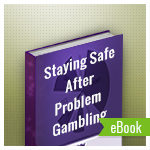Addiction Recovery: Staying Away from Gambling Posted On
It’s a tremendous step when you acknowledge your gambling addiction and make the commitment to stop gambling and begin your addiction recovery.
But once you do, how do you stay away from gambling opportunities? How do you avoid gambling when it goes on around you?
Avoiding situations that have previously led you to problem gambling is critical for your long-term recovery. Doing so will require open conversations with family and friends, self-exclusion from workplace betting pools and, very likely, other changes to your lifestyle.
Making Changes for a Gambling-Free Lifestyle
How will you avoid gambling opportunities in your future? While you may have decided to stop gambling, that isn’t the only change you’ll have to make. Your recovery may require you to socialize with different people that have previously enabled your addiction. If you gambled to avoid stressful situations, you’ll have to find a new method of facing stress management. Or, maybe you gambled to celebrate good news or with hope a big win would pay some bills.
Changes will need to be made, and these changes are not the same for every problem gambler. Identifying what triggers you to gamble is extremely important.
Making these changes will likely cause you to feel a variety of emotions, from hope and happiness to frustration and anger. It’s important that you prepare yourself to deal with these feelings, and to surround yourself with people supportive of your recovery, whether these are family members and friends or counselors and those in recovery.
Problem Gambling Resources for Your Addiction Recovery
 This week, KnowTheOdds releases its second e-book, Staying Safe After Problem Gambling. Throughout this resource, you’ll find information to help guide your recovery process in the days, months and years after you quit gambling. The e-book includes sections focused on topics such as:
This week, KnowTheOdds releases its second e-book, Staying Safe After Problem Gambling. Throughout this resource, you’ll find information to help guide your recovery process in the days, months and years after you quit gambling. The e-book includes sections focused on topics such as:
- Creating the ongoing problem gambling treatment plan that’s right for you
- Dealing with the various consequences problem gambling may have had on your life
- Identifying what your gambling triggers are in order to avoid them and ignore them
- Educating your family members and friends about compulsive gambling and your recovery
- Taking financial responsibility during your compulsive gambling recovery
- Making necessary lifestyle changes to keep you from gambling
- Handling workplace gambling conversations and opportunities
- Staying away from other addictions during your recovery from problem gambling
- Getting the help you need to avoid urges to gamble
If you’re still learning about gambling addictions, don’t forget to read our first e-book, Understanding Problem Gambling. There you’ll find a comprehensive guide to compulsive gambling, from what the signs are and whom it affects to the consequences problem gambling can have.
Whether you’ve just decided to stop your problem gambling or you’ve been on the road to recovery for a while now, we understand that recovery can be a very difficult process. If at anytime you need help, counselors are available at the NYS HOPEline 24 hours per day, 7 days per week.
Find help by calling 1-877-8-HOPENY.



DID YOU KNOW YOU WERE MY BLOG *Website* Showcase Yesterday??? check out http://CatherineLyonAddictedToDimes.wordpress.com 🙂 God Bless! *Author, Catherine Lyon* 🙂 🙂